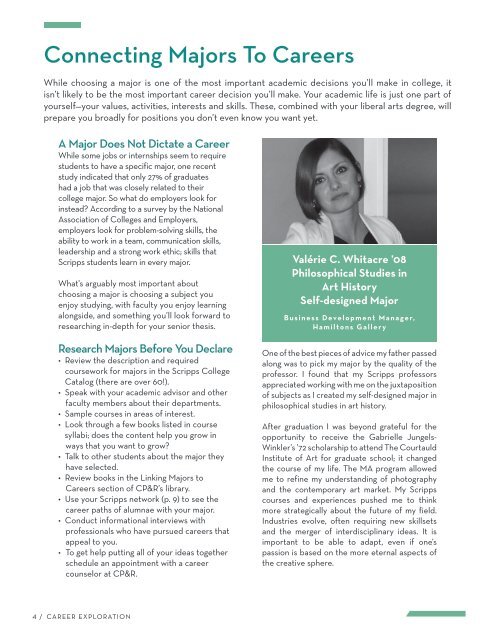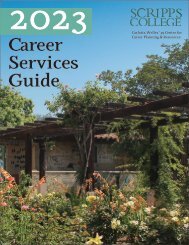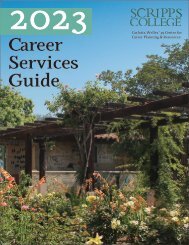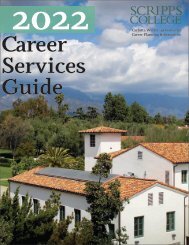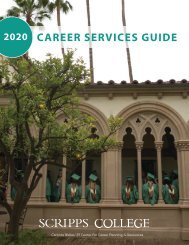2021 Career Services Guide
You also want an ePaper? Increase the reach of your titles
YUMPU automatically turns print PDFs into web optimized ePapers that Google loves.
Connecting Majors To <strong>Career</strong>s<br />
While choosing a major is one of the most important academic decisions you’ll make in college, it<br />
isn’t likely to be the most important career decision you’ll make. Your academic life is just one part of<br />
yourself—your values, activities, interests and skills. These, combined with your liberal arts degree, will<br />
prepare you broadly for positions you don’t even know you want yet.<br />
A Major Does Not Dictate a <strong>Career</strong><br />
While some jobs or internships seem to require<br />
students to have a specific major, one recent<br />
study indicated that only 27% of graduates<br />
had a job that was closely related to their<br />
college major. So what do employers look for<br />
instead? According to a survey by the National<br />
Association of Colleges and Employers,<br />
employers look for problem-solving skills, the<br />
ability to work in a team, communication skills,<br />
leadership and a strong work ethic; skills that<br />
Scripps students learn in every major.<br />
What’s arguably most important about<br />
choosing a major is choosing a subject you<br />
enjoy studying, with faculty you enjoy learning<br />
alongside, and something you’ll look forward to<br />
researching in-depth for your senior thesis.<br />
Research Majors Before You Declare<br />
• Review the description and required<br />
coursework for majors in the Scripps College<br />
Catalog (there are over 60!).<br />
• Speak with your academic advisor and other<br />
faculty members about their departments.<br />
• Sample courses in areas of interest.<br />
• Look through a few books listed in course<br />
syllabi; does the content help you grow in<br />
ways that you want to grow?<br />
• Talk to other students about the major they<br />
have selected.<br />
• Review books in the Linking Majors to<br />
<strong>Career</strong>s section of CP&R’s library.<br />
• Use your Scripps network (p. 9) to see the<br />
career paths of alumnae with your major.<br />
• Conduct informational interviews with<br />
professionals who have pursued careers that<br />
appeal to you.<br />
• To get help putting all of your ideas together<br />
schedule an appointment with a career<br />
counselor at CP&R.<br />
Valérie C. Whitacre ’08<br />
Philosophical Studies in<br />
Art History<br />
Self-designed Major<br />
Business Development Manager,<br />
Hamiltons Gallery<br />
One of the best pieces of advice my father passed<br />
along was to pick my major by the quality of the<br />
professor. I found that my Scripps professors<br />
appreciated working with me on the juxtaposition<br />
of subjects as I created my self-designed major in<br />
philosophical studies in art history.<br />
After graduation I was beyond grateful for the<br />
opportunity to receive the Gabrielle Jungels-<br />
Winkler’s ’72 scholarship to attend The Courtauld<br />
Institute of Art for graduate school; it changed<br />
the course of my life. The MA program allowed<br />
me to refine my understanding of photography<br />
and the contemporary art market. My Scripps<br />
courses and experiences pushed me to think<br />
more strategically about the future of my field.<br />
Industries evolve, often requiring new skillsets<br />
and the merger of interdisciplinary ideas. It is<br />
important to be able to adapt, even if one’s<br />
passion is based on the more eternal aspects of<br />
the creative sphere.<br />
4 / CAREER EXPLORATION


